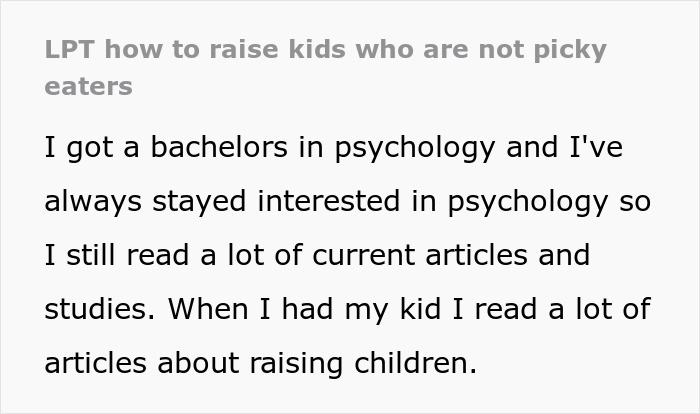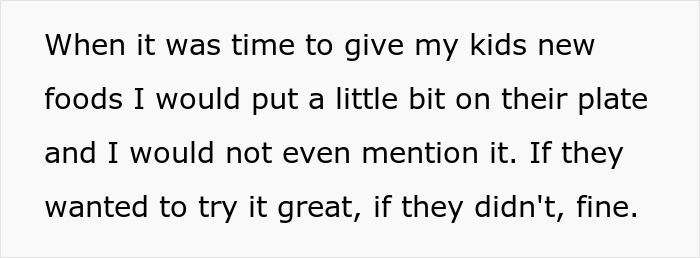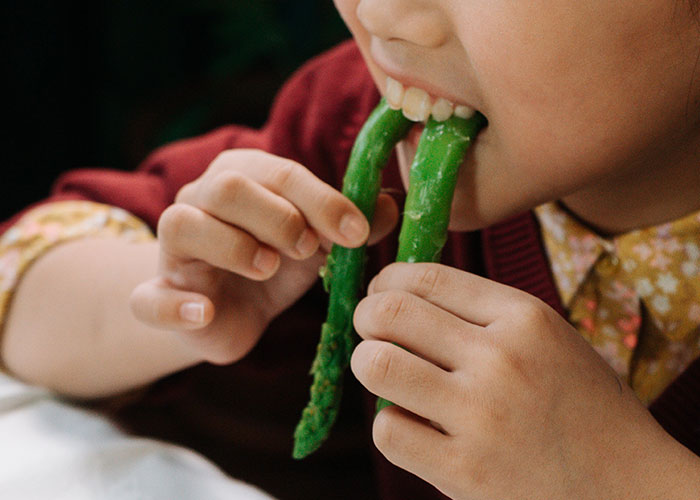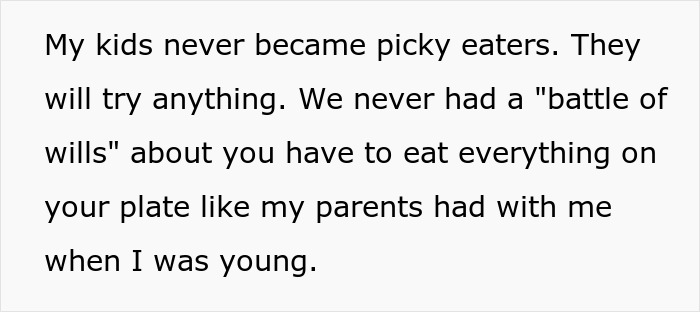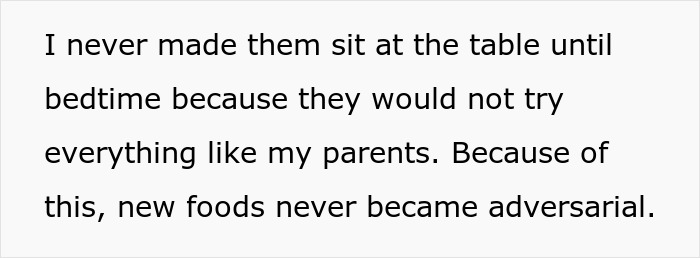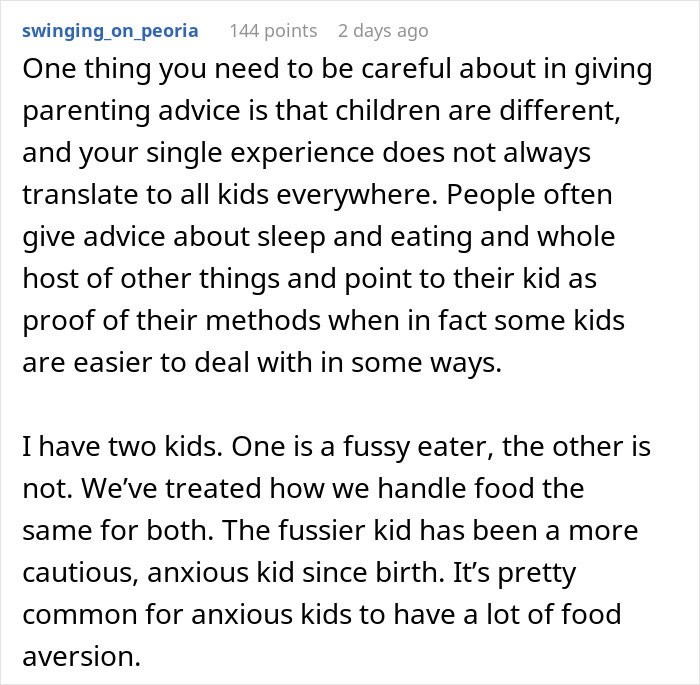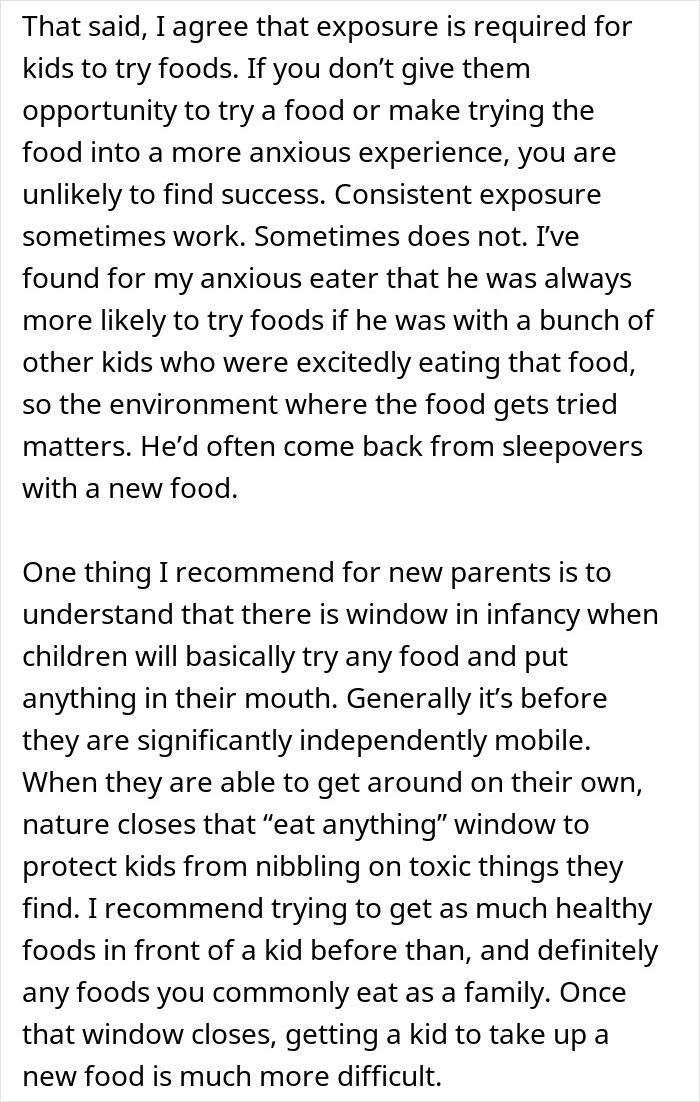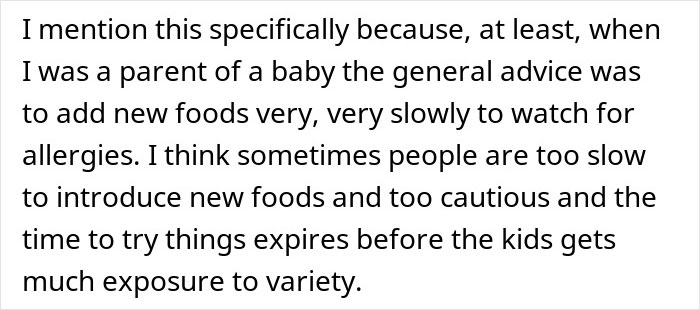“How To Raise Kids Who Are Not Picky Eaters”: Dad Cracks The Code For Kids To Clear Their Plates
Pizza, Dino nuggets and ice cream are the ideal menu crafted by any child. Unfortunately, it doesn’t even begin to cover the food groups necessary for a growing person. Kids prefer taste over nutrition, so it’s the parents’ job to ensure they eat a balanced diet.
One parent shared a pretty useful life tip on the topic. The Redditor whipsnappy adopted a strategy that lets his kids choose what they want to eat but also introduces them to new foods daily. He didn’t just pull this decision out of a hat. He based his method on scientific research done on children’s psychology. Read on to find out what faults the other netizens saw in his advice.
Bored Panda asked specialist pediatric dietician Lucy Upton to weigh in on this advice. She is an award-winning dietitian and feeding therapist, and founder of The Children’s Dietitian. Lucy helps parents navigate feeding challenges so that their children can enjoy food.
You can find her expert insights below!
More info: The Children’s Dietitian | Instagram | Facebook
Getting your kids to try new foods can be a real challenge
Image credits: Mikhail Nilov (not the actual photo)
This father based his strategy on a psychological study
Image credits: cottonbro studio (not the actual photo)
Image credits: whipsnappy
According to a children’s dietitian, this dad’s approach is pretty solid
Children’s dietitian and feeding specialist Lucy Upton observes that such a strategy can be pretty beneficial. “Many points about this approach are really positive,” she says. The dad’s method includes several points that lead to children’s healthy eating habits.
The points are as follows: “Regular exposure to foods, a no-pressure approach, eating together and allowing a child to follow their intrinsic (internal) motivation to eat something.”
However, the dad’s argument that “a child needs to see a new food an average of seven times before it becomes ‘friendly’ and recognized as ok” doesn’t always apply. “Many children will need more than the often-quoted 7-10 exposures to a food before eating it,” Upton says.
Still, she advises parents to be patient. “Don’t lose hope if your child isn’t there yet. Exposure to a wide variety of foods would also be important in the long term too,” she adds.
Is it possible that this way children might miss out on necessary food groups? Lucy has some advice for parents who may worry. “Regarding nutritional deficiencies, risks tend to increase if children are missing foods within a whole food group e.g. eat not protein or iron-rich foods, or have under 15-20 foods overall.”
So as long as your kid is not living solely off plain bread and ice cream, they should be fine.
How and what parents feed their children is only part of the equation
Many commenters under OP’s post noted that they tried this exact method and it didn’t work for them. Sometimes it’s more about the child’s tastes and opinions, and there’s not much a parent can do.
Lucy Upton says that there are a lot of factors that lead to kids being fussy eaters. “Like many nutrition-related conditions, there are factors that parents can and cannot influence,” she explains.
“It’s well established that genetics, personality, sensory differences, early feeding history and presence of other conditions e.g. reflux or allergies can influence a child’s interactions with food, and the likelihood of ‘pickiness’.
However, parents shouldn’t feel discouraged to try and change their kid’s eating habits. “We recognize that HOW children are fed, and approaches taken by parents (sometimes referred to as food parenting) can be hugely influential on the persistence of picky eating or the length of time it takes for things to improve.”
Commenters agreed with OP’s strategy and offered more tips
However, other parents said this method didn’t work for them and is not suited for everyone
[ad_2]
Pizza, Dino nuggets and ice cream are the ideal menu crafted by any child. Unfortunately, it doesn’t even begin to cover the food groups necessary for a growing person. Kids prefer taste over nutrition, so it’s the parents’ job to ensure they eat a balanced diet.
One parent shared a pretty useful life tip on the topic. The Redditor whipsnappy adopted a strategy that lets his kids choose what they want to eat but also introduces them to new foods daily. He didn’t just pull this decision out of a hat. He based his method on scientific research done on children’s psychology. Read on to find out what faults the other netizens saw in his advice.
Bored Panda asked specialist pediatric dietician Lucy Upton to weigh in on this advice. She is an award-winning dietitian and feeding therapist, and founder of The Children’s Dietitian. Lucy helps parents navigate feeding challenges so that their children can enjoy food.
You can find her expert insights below!
More info: The Children’s Dietitian | Instagram | Facebook
Getting your kids to try new foods can be a real challenge
Image credits: Mikhail Nilov (not the actual photo)
This father based his strategy on a psychological study
Image credits: cottonbro studio (not the actual photo)
Image credits: whipsnappy
According to a children’s dietitian, this dad’s approach is pretty solid
Children’s dietitian and feeding specialist Lucy Upton observes that such a strategy can be pretty beneficial. “Many points about this approach are really positive,” she says. The dad’s method includes several points that lead to children’s healthy eating habits.
The points are as follows: “Regular exposure to foods, a no-pressure approach, eating together and allowing a child to follow their intrinsic (internal) motivation to eat something.”
However, the dad’s argument that “a child needs to see a new food an average of seven times before it becomes ‘friendly’ and recognized as ok” doesn’t always apply. “Many children will need more than the often-quoted 7-10 exposures to a food before eating it,” Upton says.
Still, she advises parents to be patient. “Don’t lose hope if your child isn’t there yet. Exposure to a wide variety of foods would also be important in the long term too,” she adds.
Is it possible that this way children might miss out on necessary food groups? Lucy has some advice for parents who may worry. “Regarding nutritional deficiencies, risks tend to increase if children are missing foods within a whole food group e.g. eat not protein or iron-rich foods, or have under 15-20 foods overall.”
So as long as your kid is not living solely off plain bread and ice cream, they should be fine.
How and what parents feed their children is only part of the equation
Many commenters under OP’s post noted that they tried this exact method and it didn’t work for them. Sometimes it’s more about the child’s tastes and opinions, and there’s not much a parent can do.
Lucy Upton says that there are a lot of factors that lead to kids being fussy eaters. “Like many nutrition-related conditions, there are factors that parents can and cannot influence,” she explains.
“It’s well established that genetics, personality, sensory differences, early feeding history and presence of other conditions e.g. reflux or allergies can influence a child’s interactions with food, and the likelihood of ‘pickiness’.
However, parents shouldn’t feel discouraged to try and change their kid’s eating habits. “We recognize that HOW children are fed, and approaches taken by parents (sometimes referred to as food parenting) can be hugely influential on the persistence of picky eating or the length of time it takes for things to improve.”
Commenters agreed with OP’s strategy and offered more tips
However, other parents said this method didn’t work for them and is not suited for everyone
Read original article here

